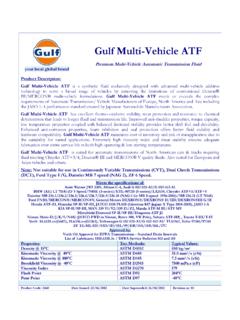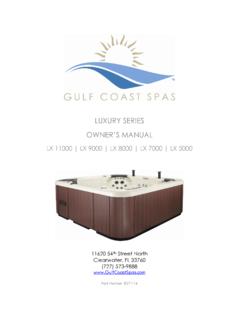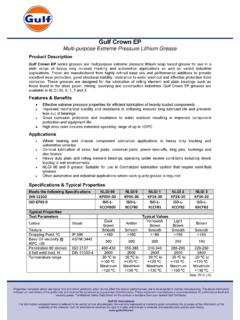Transcription of Why High Nitration is Not Good for Your Engine By …
1 Why High Nitration is Not Good for Your Engine By Jerry Sims president , gulf Coast Filters, Inc. In recent weeks I have had several people ask me about High Nitration in oil samples and that some people have heard that it is normal. I addressed this issue in a warning ad to truckers and during a recent interview on a radio show. The interview was over 20 minutes but had to be edited down to less than 10 so the information on the Nitration was edited out but will be addressed in a future spot. Let me clarify something right up front, High Nitration is not normal in Over the Road Diesel Engines. I have talked with some of the top engineers at several major oil companies and they agree with me that High Nitration is only normal in Natural Gas Engines and should not be an issue in typical truck engines if they are maintaining their lube oil in a suitable condition.
2 They also agree with me that if High Nitration is not normal in truck engines it may be that the user is not adding enough make-up oil to refresh the additives in the oil. Now, I for one can tell you that gulf Coast Filters reads thousands of reports and our customers have normal Nitration Numbers and if High Nitration was normal I would be seeing it. That should put up a Red Flag right there, if thousands of not just our customers, but thousands of other truckers are not showing High Nitration in their oil it is not normal and if someone says it is they are ABSOLUTELY INCORRECT!!! What I find very interesting is how someone can try to explain to truckers that having High Nitration is not harmful to your Engine . If that were the case why do just about all of the Major Oil Companies have additives in their oils to resist and combat Nitration ?
3 Why do the Laboratories bother checking the Nitration Level in the oil if it were not harmful to the Engine ? If you do an internet search on these key words, New Oil Nitration you can scroll through several pages and find good information on why the oil companies put additives in their oil and statements like Exceptional oxidation and Nitration resistance for long oil life You will also see that High Nitration is only normal in Natural Gas Engines. Look below at one of the most common definitions of Nitration and I think you will agree with me that Nitration is not a good thing for your Engine and causes oil degradation. Nitration is caused by oil degradation in a reduced oxygen environment and results in nitrogenous by products. These compounds contain acidic precursors that may combine with water to form nitrous acids in the lubricant.
4 These acids attack the oil, reducing additive effectiveness and increasing the rate of oil degradation, which creates varnish, lacquer, sludge and Engine deposits. Infrared analysis is used to directly measure Nitration products in the Engine lubricant. Nitration can be a problem for EGR engines due to NOx compounds forming deposits reacting with the lubricant. You as an owner of a very expensive diesel Engine that you depend on need to do your research if you hear things that go against what Experts have proven over many years in the industry. Look at the person or companies background, how long they have been in the oil analysis business and what qualifies them to be an expert on the subject. I find it pretty unbelievable how some folks that are not even qualified in the field are suddenly experts on oil analysis.
5 I can tell you this; if someone tells you that running your diesel Engine on oil with High Nitration is good it goes against everything gulf Coast Filters has learned over a period of 30 Years. Something else to think about is that if someone has High Nitration in their oil, they must not be getting the moisture out of the Engine because the NOx only becomes an issue when it mixes with Moisture and other contamination in the oil to form NOx compounds. See below some good technical information on oil contamination and how to Safely Extend Oil Drains. The following is an outline of the steps that gulf Coast Filters, Inc. would recommend in order to SAFELY Extend and/or Eliminate routine oil drain intervals on your engines. Within the following information I will cover what we have established (over a period of years starting in 1965) as obtainable goals in accomplishing this task.
6 Let us start by understanding the current situation that you are operating under. Your engines are presently equipped (with few exceptions) with only full-flow oil filters and you are following a routine oil drain interval. The factory full-flow filters on your engines are performing a protecting job, in that they are designed to remove the larger particles that would damage vital parts. The additive package of the oil is then utilized to hold the smaller microscopic contaminants that the full-flow has missed, in suspension, and to combat other problems such as acid formation, oxidation, Nitration , moisture intrusion, and etc. The oil is allowed to remain in the Engine until it becomes contaminated to the point that it is no longer suitable for use within the Engine . When Is This Point Reached? According to American Petroleum Institute (API) Publication #1507, page 13, Engine oil should be changed before additive depletion and oil contaminants can begin to affect Engine performance and life.
7 gulf Coast Filters, Inc. fully endorses this recommendation! In order to eliminate the process of routine oil drains, thereby drastically reducing the amount of waste oil being generated, we must install additional filtration and establish the proper service intervals for these filters to deal with contamination missed by the full-flow filters and other types of contamination. There are three basic types of contamination that must be dealt with: Solid , Moisture and Condition Caused Contamination. The following pages will fully explain these types of contamination and how adding additional By-Pass filtration will effectively control these areas. 1. Solid Contamination: It is generally recognized, backed by numerous tests and studies over the last 40 years, that contamination generated in an Engine that is responsible for the majority of "normal" wear, is within the 1 - 20 micron range.
8 Also this small solid contamination contributes to accelerating Condition Caused Contaminants such as Oxidation, Nitration , Acid Formation and more. Consequently, it is imperative that this contamination be removed from the system as fast as possible. The typical factory full-flow filter cannot control 1 - 20 micron particles due to its porous design to supply the Engine with a high flow rate of oil. One must use filtration that is capable of controlling solids in the 1 - 20 micron range and smaller. 2. Moisture Contamination: Moisture contamination within the lube oil will cause viscosity increase, VI polymer decrease, TBN decrease, acid formation, accelerated oxidation and Nitration . If left unchecked, it will cause accelerated wear, filter plugging, sludge formation, and corrosion of parts. To safely eliminate routine oil drains, one must use additional filtration that utilizes an adsorbent filter media, which can remove suspended moisture from the lube oil.
9 3. Condition Caused Contamination: There are three MAJOR types of contamination that are formed within the lube oil during normal use: Oxidation, Nitration , and Acid. These contaminants are formed when solid and moisture contamination are present, and certain operating conditions exist within the Engine . These Condition Caused Contaminants can be controlled by the use of additional filtration and with the proper filter service interval. a. Oxidation: Oxidation occurs when the hydrocarbon constituents (and other products) of lube oil combine chemically with oxygen. Lube oil in engines will combine with available oxygen under certain conditions to form a wide variety of oxidation products. Many of these direct or primary oxidation products combine with other materials such as wear metals, solid contamination, and moisture, to form second and third derivative products.
10 As with most chemical reactions, oil oxidation is accelerated by heat and pressure. Heat in particular will speed up the oxidation process. Various studies have shown that lube oxidation (with many variables such as the type lubricant and additive package in the lubricant) that the oxidation rate can be doubled for every 15 to 20 degrees increase over 180 degrees F. Also, Engine load, which will dictate the levels of oxygen and pressure within the Engine , will accelerate the oxidation process. Effects of oxidation within the Engine can be seen in the form of accelerated acid formation, corrosion, oil thickening, deposit formation, and accelerated wear. Most of all the top quality lube oils have an additive package that contains oxidation inhibitors to slow the oxidation process and alkaline detergents that will neutralize acids formed by oxidation. Normally these additives will only last a certain length of time before they are used up and the oil must be drained.






